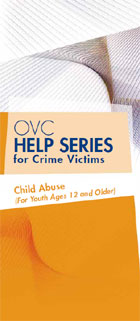 What Is Child Abuse?
What Is Child Abuse?Child abuse is when an adult—usually a parent, family member, caretaker, or someone else close to the family—hurts a child or teen, makes that youth feel worthless, has sexual contact with him or her, or does not provide adequate food, care, or shelter. Child abuse can happen to all types of kids and in all types of families. And it isn’t something that only happens to little kids: 32 percent of 14- to 17-year-olds in the United States have been abused or neglected in their lifetimes, and 28 percent have been sexually victimized.1
From time to time, all parents and children have problems, but most parents and adults do not abuse children. There is no single reason why people abuse others. Some adults abuse children because they themselves were abused when they were children. Others just can’t handle their feelings in a healthy way; they might be worried about something, like a problem at work or not having enough money to pay their bills, and take it out on their kids. Drinking alcohol or using drugs can also make it hard for some people to control their actions.
No matter what the reason is for the adult’s behavior, it’s important to know that child abuse is never the child’s fault.
It may sound strange, but people who have lived with abuse for many years may not even realize that they are being abused. If you have grown up in a family where abuse occurs almost every day, you may think that hitting, pushing, or constant yelling are normal ways to treat the members of your family and other people. Every family has arguments, but when yelling goes too far or lasts too long or when disagreements turn physical, that is abuse, and abuse is not normal or healthy.
It may help to understand and recognize that kids may experience one or more of these four kinds of abuse.
If you have been hurt—physically, sexually, emotionally, or due to neglect—you may be a victim of abuse. Abuse and neglect can affect the way you view yourself and the rest of the world. You might—
If you feel things are not so great in your family, or if things in your life hurt or confuse you, keep reading. You’ll see that it’s not your fault and that things can get better.
The way to stop abuse is to talk about it. If you or someone you know is being abused, it’s important for you to tell someone you trust. Trusting someone after you’ve been hurt can be hard to do, but there are people who will believe you and want to help you. If there is no one you can trust at home, talk to someone at school, like a teacher, counselor, school nurse, coach, or a friend’s mom or dad. You should not keep the abuse a secret, even if the adult abusing you tells you that something bad will happen if you tell.
Sometimes, the people you turn to may not want to believe that you have been abused. If you talk to someone who is not helpful or who tells you to forget about the abuse, don’t give up. Tell someone else, and keep telling until you get the help you need to feel safe.
Talking to someone can help you—
Some adults are required by law to report some types of abuse to child protection services or the police. These professionals investigate abuse and find ways to protect youth and, if possible, keep families together. Although an investigation can sometimes be difficult and cause children and families to worry about what will happen to the abuser and to their family, remember that these professionals need to find out the truth so they can stop the abuse and get children and families the help they need to recover and get their lives back on the right track.
It takes courage to ask for help, but if you are abused and you tell someone, things can get better. If you are too nervous or scared to tell someone you know, you can talk to a counselor at the ChildHelp National Child Abuse Hotline by calling 1-800-4-A-CHILD (1-800-422-4453).
ChildHelp National Child Abuse Hotline
Crisis counselors are available to talk 24 hours/day.
1-800-4-A-CHILD or 1-800-422-4453
www.childhelp.org
National Sexual Assault Hotline
This 24-hour online hotline provides free and confidential support to survivors of sexual assault and their family and friends.
www.rainn.org
National Runaway Switchboard
This confidential 24-hour service helps youth in crisis find local resources.
1-800-RUNAWAY or 1-800-786-2929
www.1800runaway.org